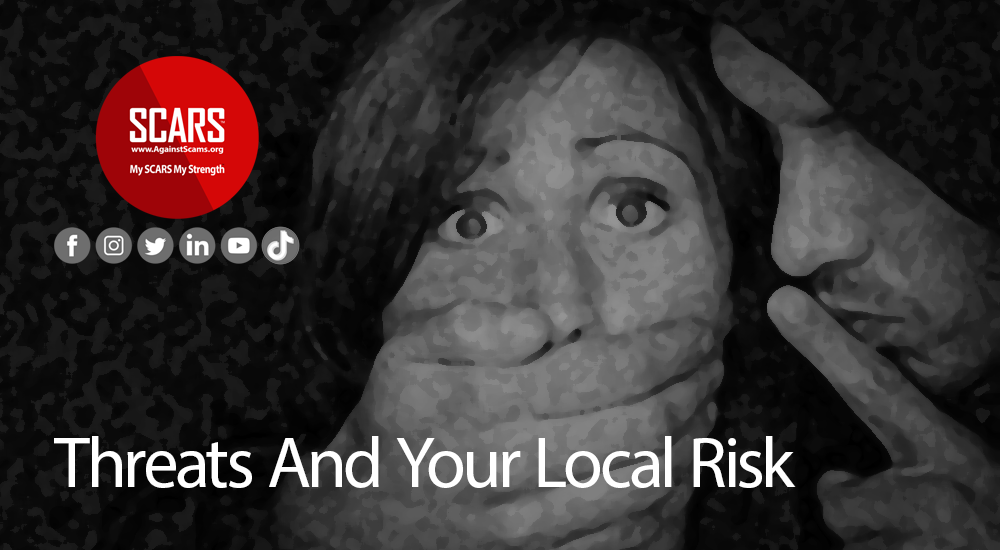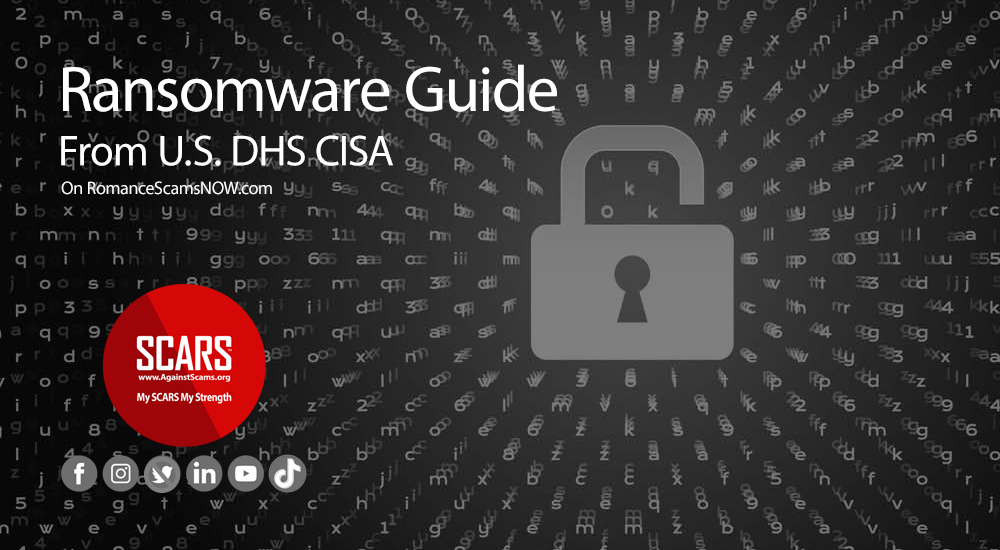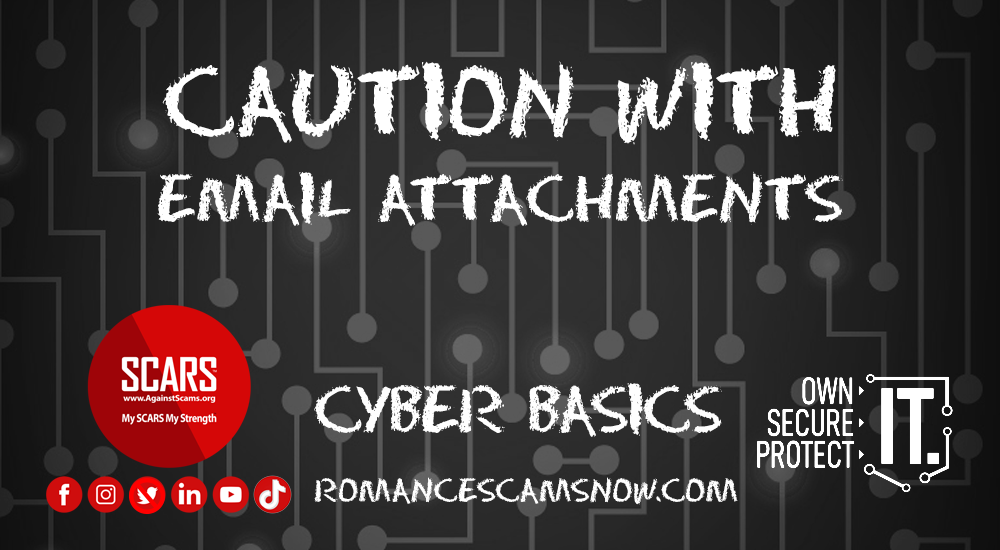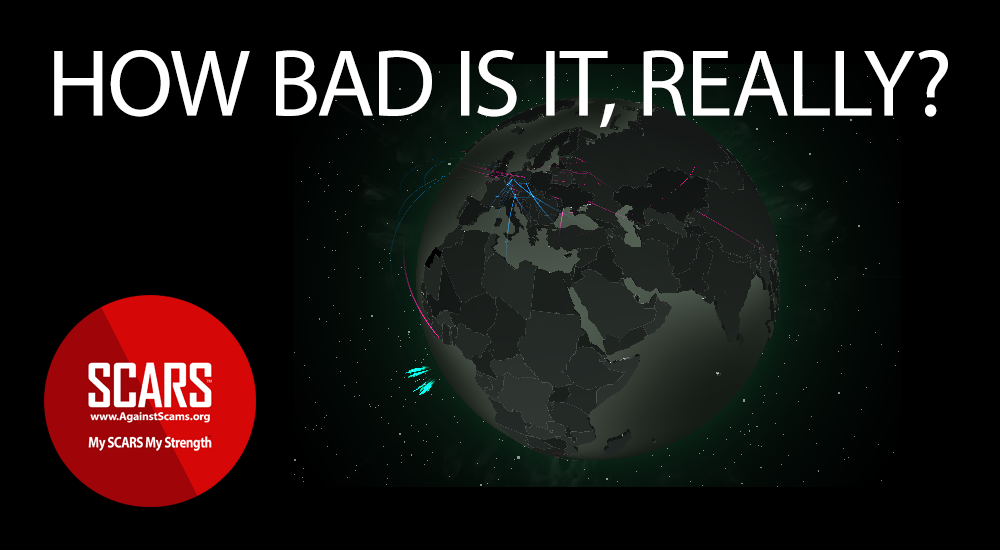
SCARS Institute’s Encyclopedia of Scams™ Published Continuously for 25 Years

Are You Worried That Scammers Will Come After You?
We have heard from countless victims who truly feared for their lives! Almost always without real reason, but for every rule there are exceptions.
Let’s Break Down What Your Real Risks Are:
It is important to understand that not all scammers or online criminals are African. Frankly, this makes a major difference in the type and magnitude of risk to you and your family. Remember, we are not talking about online reach – we are talking about the physical/real-world reach here!
- African Scammers – are primarily just online thugs – even if they work for a major African Scamming Cartel – they are local in Africa (generally) – more about them later
- Russian and Eastern European Online Criminals – these guys have a network of criminals all over the world. They are in your town or at least nearby
- Chinese Online Criminals – they also have major networks throughout the world
- Caribbean Online Scammers And Thugs – are mostly just in the Caribbean but they have friends throughout the Americas and Europe – almost no one in Asia
- Iranian Online Criminals – are very limited – they hide from within Iran
- North Korean Scammers And Cybercriminals – they are also very limited to their own country almost exclusively
- Philippines Scammers – while they have lots of friends everywhere, they are just local in the Philippines (same with other South and Southeast Asians)
- Homegrown Con-Artists – are local and a real potential threat
- Other Kinds Of Criminals Online – such as pedophiles, stalkers, human traffickers, rapists, and more are also local and potentially real threats
Categories of Risk
Now that we have defined the most obvious types of online criminals let’s break them down into a few risk categories:
- HIGHEST RISK – local threats. Anyone that is in your country is a potential threat – a real potential threat. Always be cautious about ANYONE that is after more than just money, or makes threats against you and your family. These should always be reported to your LOCAL POLICE IMMEDIATELY.
- MEDIUM RISK – maybe local threats. Yes, cybercriminals from different parts of the world may have local operatives, but in general, they want money from their activities and do not want to involve local attention. For example, Nigerian Scammers are more of a risk to the English than they are Canadians or Americans, just because there are more Nigerians in the U.K. and they are more criminally organized. Same for Russian bride scams in the U.K. and Europe. But always involve your local police when there are any threats made that you feel may be a real risk.
- LOW RISK – we never say ZERO RISK but most romance and online scams out of Africa are very low risk. This is because scammers do not need or especially want a network of criminal gangs around the world to hunt down victims. They just want to do their thing (con you out of your money) and have the authorities leave them alone. Local actions will bring far too much attention to countries that have professional law enforcement that can chase these criminals back to their home countries. So scams are almost always limited to financial losses for the victim regardless of how many threats the scammers throw at their victims.
Of course, any threat that is made against you or your family is serious regardless of who or where it comes from.
We always encourage you to report all scams properly, and if there are money losses or threats involved always talk to your local police. Even if you just suspect you are at risk because you gave out your address or enough information for the bad guys to find you and your family talk to the police. At a minimum, the police can record the event and be able to respond rapidly if something goes wrong. They may tell you there is nothing to worry about, and most of the time they will be right, but informed is prepared, and then they will take you seriously if something really does happen.
Unfortunately, we cannot tell you what the risk is in every situation. We can only generalize, but you have to assess your own situation and we always suggest you lean to the side of caution. Better safe than sorry – don’t you wish you had thought of that before becoming involved with a scammer in the first place? But now you can!
We hope this guide helps you better understand how to think about the risks and that you can better decide what to do if you are threatened. Please share your views and experiences with us in a comment below!
-/ 30 /-
What do you think about this?
Please share your thoughts in a comment below!
LEAVE A COMMENT?
Recent Comments
On Other Articles
- Arwyn Lautenschlager on Love Bombing And How Romance Scam Victims Are Forced To Feel: “I was love bombed to the point that I would do just about anything for the scammer(s). I was told…” Feb 11, 14:24
- on Dani Daniels (Kira Lee Orsag): Another Scammer’s Favorite: “You provide a valuable service! I wish more people knew about it!” Feb 10, 15:05
- on Danielle Delaunay/Danielle Genevieve – Stolen Identity/Stolen Photos – Impersonation Victim UPDATED 2024: “We highly recommend that you simply turn away form the scam and scammers, and focus on the development of a…” Feb 4, 19:47
- on The Art Of Deception: The Fundamental Principals Of Successful Deceptions – 2024: “I experienced many of the deceptive tactics that romance scammers use. I was told various stories of hardship and why…” Feb 4, 15:27
- on Danielle Delaunay/Danielle Genevieve – Stolen Identity/Stolen Photos – Impersonation Victim UPDATED 2024: “Yes, I’m in that exact situation also. “Danielle” has seriously scammed me for 3 years now. “She” (he) doesn’t know…” Feb 4, 14:58
- on An Essay on Justice and Money Recovery – 2026: “you are so right I accidentally clicked on online justice I signed an agreement for 12k upfront but cd only…” Feb 3, 08:16
- on The SCARS Institute Top 50 Celebrity Impersonation Scams – 2025: “Quora has had visits from scammers pretending to be Keanu Reeves and Paul McCartney in 2025 and 2026.” Jan 27, 17:45
- on Scam Victims Should Limit Their Exposure To Scam News & Scammer Photos: “I used to look at scammers photos all the time; however, I don’t feel the need to do it anymore.…” Jan 26, 23:19
- on After A Scam, No One Can Tell You How You Will React: “This article was very informative, my scams happened 5 years ago; however, l do remember several of those emotions and/or…” Jan 23, 17:17
- on Situational Awareness and How Trauma Makes Scam Victims Less Safe – 2024: “I need to be more observant and I am practicing situational awareness. I’m saving this article to remind me of…” Jan 21, 22:55
ARTICLE META
Important Information for New Scam Victims
- Please visit www.ScamVictimsSupport.org – a SCARS Website for New Scam Victims & Sextortion Victims
- Enroll in FREE SCARS Scam Survivor’s School now at www.SCARSeducation.org
- Please visit www.ScamPsychology.org – to more fully understand the psychological concepts involved in scams and scam victim recovery
If you are looking for local trauma counselors please visit counseling.AgainstScams.org or join SCARS for our counseling/therapy benefit: membership.AgainstScams.org
If you need to speak with someone now, you can dial 988 or find phone numbers for crisis hotlines all around the world here: www.opencounseling.com/suicide-hotlines
A Note About Labeling!
We often use the term ‘scam victim’ in our articles, but this is a convenience to help those searching for information in search engines like Google. It is just a convenience and has no deeper meaning. If you have come through such an experience, YOU are a Survivor! It was not your fault. You are not alone! Axios!
A Question of Trust
At the SCARS Institute, we invite you to do your own research on the topics we speak about and publish, Our team investigates the subject being discussed, especially when it comes to understanding the scam victims-survivors experience. You can do Google searches but in many cases, you will have to wade through scientific papers and studies. However, remember that biases and perspectives matter and influence the outcome. Regardless, we encourage you to explore these topics as thoroughly as you can for your own awareness.
Statement About Victim Blaming
SCARS Institute articles examine different aspects of the scam victim experience, as well as those who may have been secondary victims. This work focuses on understanding victimization through the science of victimology, including common psychological and behavioral responses. The purpose is to help victims and survivors understand why these crimes occurred, reduce shame and self-blame, strengthen recovery programs and victim opportunities, and lower the risk of future victimization.
At times, these discussions may sound uncomfortable, overwhelming, or may be mistaken for blame. They are not. Scam victims are never blamed. Our goal is to explain the mechanisms of deception and the human responses that scammers exploit, and the processes that occur after the scam ends, so victims can better understand what happened to them and why it felt convincing at the time, and what the path looks like going forward.
Articles that address the psychology, neurology, physiology, and other characteristics of scams and the victim experience recognize that all people share cognitive and emotional traits that can be manipulated under the right conditions. These characteristics are not flaws. They are normal human functions that criminals deliberately exploit. Victims typically have little awareness of these mechanisms while a scam is unfolding and a very limited ability to control them. Awareness often comes only after the harm has occurred.
By explaining these processes, these articles help victims make sense of their experiences, understand common post-scam reactions, and identify ways to protect themselves moving forward. This knowledge supports recovery by replacing confusion and self-blame with clarity, context, and self-compassion.
Additional educational material on these topics is available at ScamPsychology.org – ScamsNOW.com and other SCARS Institute websites.
Psychology Disclaimer:
All articles about psychology and the human brain on this website are for information & education only
The information provided in this article is intended for educational and self-help purposes only and should not be construed as a substitute for professional therapy or counseling.
While any self-help techniques outlined herein may be beneficial for scam victims seeking to recover from their experience and move towards recovery, it is important to consult with a qualified mental health professional before initiating any course of action. Each individual’s experience and needs are unique, and what works for one person may not be suitable for another.
Additionally, any approach may not be appropriate for individuals with certain pre-existing mental health conditions or trauma histories. It is advisable to seek guidance from a licensed therapist or counselor who can provide personalized support, guidance, and treatment tailored to your specific needs.
If you are experiencing significant distress or emotional difficulties related to a scam or other traumatic event, please consult your doctor or mental health provider for appropriate care and support.
Also read our SCARS Institute Statement about Professional Care for Scam Victims – click here to go to our ScamsNOW.com website.
















Thank you for your comment. You may receive an email to follow up. We never share your data with marketers.